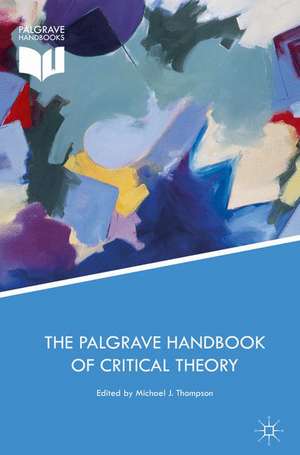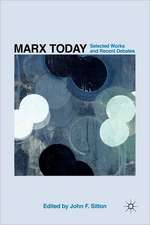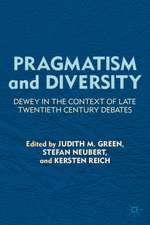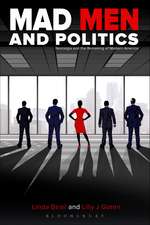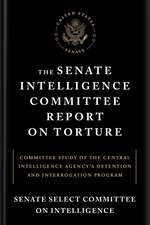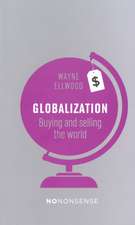The Palgrave Handbook of Critical Theory: Political Philosophy and Public Purpose
Editat de Michael J. Thompsonen Limba Engleză Hardback – 22 ian 2017
Din seria Political Philosophy and Public Purpose
- 20%
 Preț: 689.87 lei
Preț: 689.87 lei - 15%
 Preț: 697.18 lei
Preț: 697.18 lei -
 Preț: 379.96 lei
Preț: 379.96 lei -
 Preț: 374.30 lei
Preț: 374.30 lei - 15%
 Preț: 629.38 lei
Preț: 629.38 lei - 15%
 Preț: 627.11 lei
Preț: 627.11 lei -
 Preț: 375.81 lei
Preț: 375.81 lei - 18%
 Preț: 876.34 lei
Preț: 876.34 lei - 15%
 Preț: 629.52 lei
Preț: 629.52 lei - 18%
 Preț: 927.07 lei
Preț: 927.07 lei -
 Preț: 411.96 lei
Preț: 411.96 lei - 15%
 Preț: 490.62 lei
Preț: 490.62 lei - 18%
 Preț: 768.61 lei
Preț: 768.61 lei - 15%
 Preț: 576.47 lei
Preț: 576.47 lei - 15%
 Preț: 571.66 lei
Preț: 571.66 lei -
 Preț: 417.03 lei
Preț: 417.03 lei - 18%
 Preț: 871.41 lei
Preț: 871.41 lei - 15%
 Preț: 625.52 lei
Preț: 625.52 lei - 18%
 Preț: 764.58 lei
Preț: 764.58 lei - 18%
 Preț: 706.73 lei
Preț: 706.73 lei - 18%
 Preț: 767.64 lei
Preț: 767.64 lei - 18%
 Preț: 773.98 lei
Preț: 773.98 lei - 18%
 Preț: 714.91 lei
Preț: 714.91 lei - 18%
 Preț: 767.51 lei
Preț: 767.51 lei - 18%
 Preț: 877.75 lei
Preț: 877.75 lei -
 Preț: 383.16 lei
Preț: 383.16 lei -
 Preț: 377.51 lei
Preț: 377.51 lei -

Preț: 1379.83 lei
Preț vechi: 1682.71 lei
-18% Nou
Puncte Express: 2070
Preț estimativ în valută:
264.11€ • 276.94$ • 218.22£
264.11€ • 276.94$ • 218.22£
Carte tipărită la comandă
Livrare economică 29 ianuarie-12 februarie 25
Preluare comenzi: 021 569.72.76
Specificații
ISBN-13: 9781137558008
ISBN-10: 1137558008
Pagini: 500
Ilustrații: XVII, 739 p. 1 illus.
Dimensiuni: 155 x 235 x 40 mm
Greutate: 1.23 kg
Ediția:1st ed. 2017
Editura: Palgrave Macmillan US
Colecția Palgrave Macmillan
Seria Political Philosophy and Public Purpose
Locul publicării:New York, United States
ISBN-10: 1137558008
Pagini: 500
Ilustrații: XVII, 739 p. 1 illus.
Dimensiuni: 155 x 235 x 40 mm
Greutate: 1.23 kg
Ediția:1st ed. 2017
Editura: Palgrave Macmillan US
Colecția Palgrave Macmillan
Seria Political Philosophy and Public Purpose
Locul publicării:New York, United States
Cuprins
Introduction: What Is Critical Theory? .- Critical Foundations: History, Reflection, Praxis .- Marx’s Influence on the Early Frankfurt School .- Lukács’s Theory of Reification and the Tradition of Critical Theory .- Totality, Reason, Dialectics: The Importance of Hegel for Critical Theory .- Why Students of the Frankfurt School Need to Read Lukacs .- Critical Theory and the Historical Transformations of Capitalist Modernity .- Critical Theory as Radical Comparative-Historical Research .- The Frankfurt School and the Critique of Instrumental Reason .- Materialism in Critical Theory: Marx and the Early Horkheimer .- Critique As the Epistemic Framework of the Critical Social Sciences .- Christoph Henning: Theories of Culture in the Frankfurt School of Critical Theory .- On Adorno’s Aesthetic Theory .- Art and the Concept of Autonomy in Adorno’s Critique of Kant .- Judging by Refraining from Judgment: The Artwork and Its Einordnung .- Dirk Michel-Schertges: Critical Theory and the Aesthetic Conditions for Revolution .- What Does It Mean to be Critical? On Literary and Social Critique in Walter Benjamin .- Theory and Class Consciousness .- The Frankfurt School, Authority, and the Psychoanalysis of Utopia .- Culture, Character and Critique: The Social Psychology of the Frankfurt School .- The Critical Theory of Sadomasochism and Authoritarianism .- The Fromm-Marcuse Debate Revisited: Reformulating the Critical Theory of the Authoritarian Character .- The Metaethics of Critical Theories .- Collective Agency and Intentionality: A Critical Theory Perspective .- Recognition, Identity and Subjectivity .- Recognition, Social Systems and Critical Theory .- The Sociological Roots and Deficits of Axel Honneth’s Theory of Recognition .- Experience and Temporality: Toward a New Paradigm of Critical Theory .- Critical Theory of Human Rights .- Immanent Critique and the Exhaustion Thesis: Neoliberalism and History’s Vicissitudes .- Critical Theory and Global Development .- The New Sensibility, Intersectionality, and Democratic Attunement: the Future of Critical Theory.
<Notă biografică
Michael J. Thompson is Associate Professor of Political Theory in the Department of Political Science, William Paterson University, USA.
Textul de pe ultima copertă
This handbook is the only major survey of critical theory from philosophical, political, sociological, psychological and historical vantage points. It emphasizes not only on the historical and philosophical roots of critical theory, but also its current themes and trends as well as future applications and directions. It addresses specific areas of interest that have forged the critical theory tradition, such as critical social psychology, aesthetics and the critique of culture, communicative action, and the critique of instrumental reason. It is intended for those interested in exploring the influential paradigm of critical theory from multiple, interdisciplinary perspectives and understanding its contribution to the humanities and the social sciences.
Caracteristici
Offers the first full and in-depth handbook account of critical theory from the Frankfurt School through today Explores central themes and concepts of critical theory from diverse perspectives in political science, philosophy, sociology, anthropology, comparative literature, art and aesthetics, and history Contains contributions from leading scholars and critical theorists from around the world
